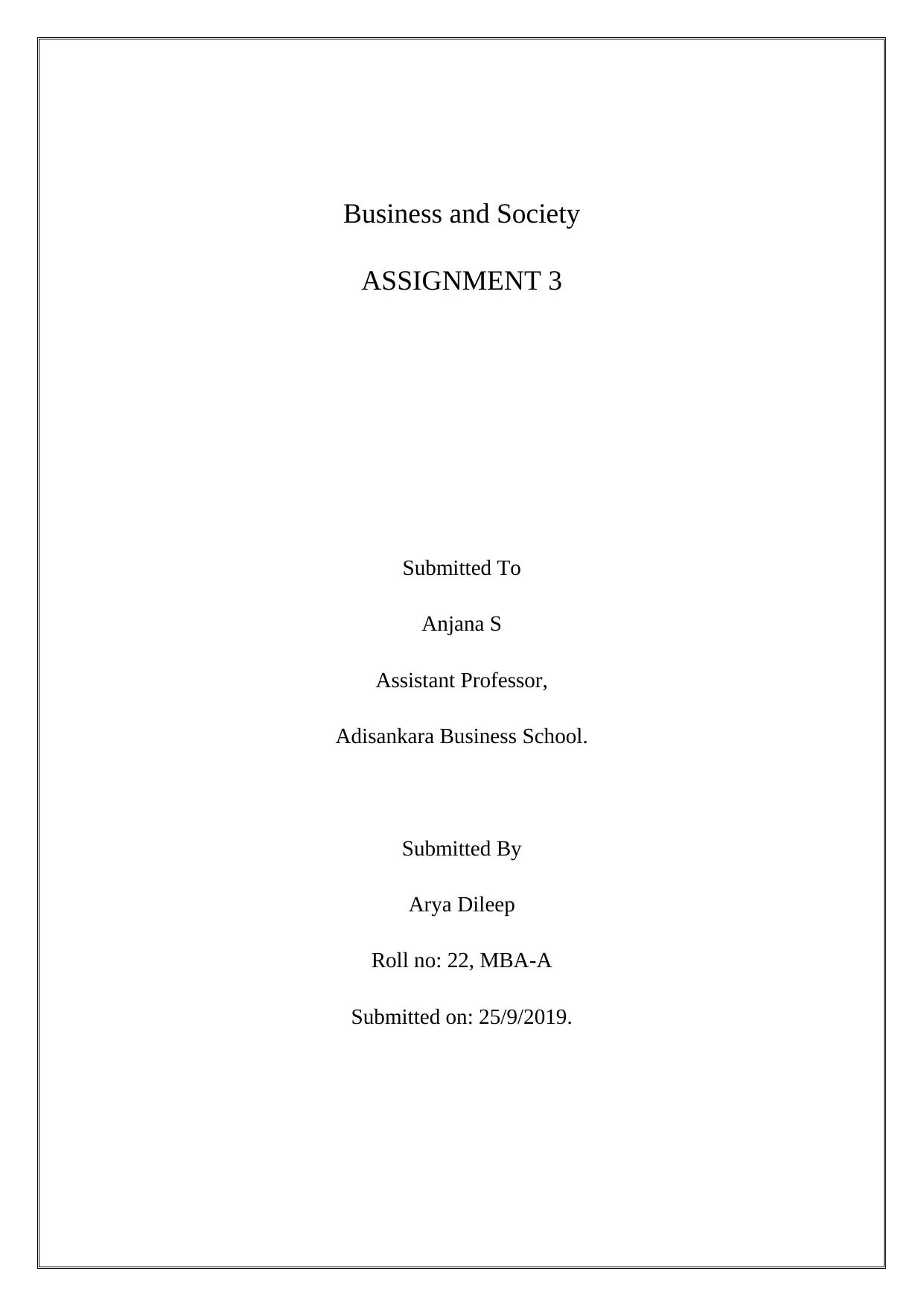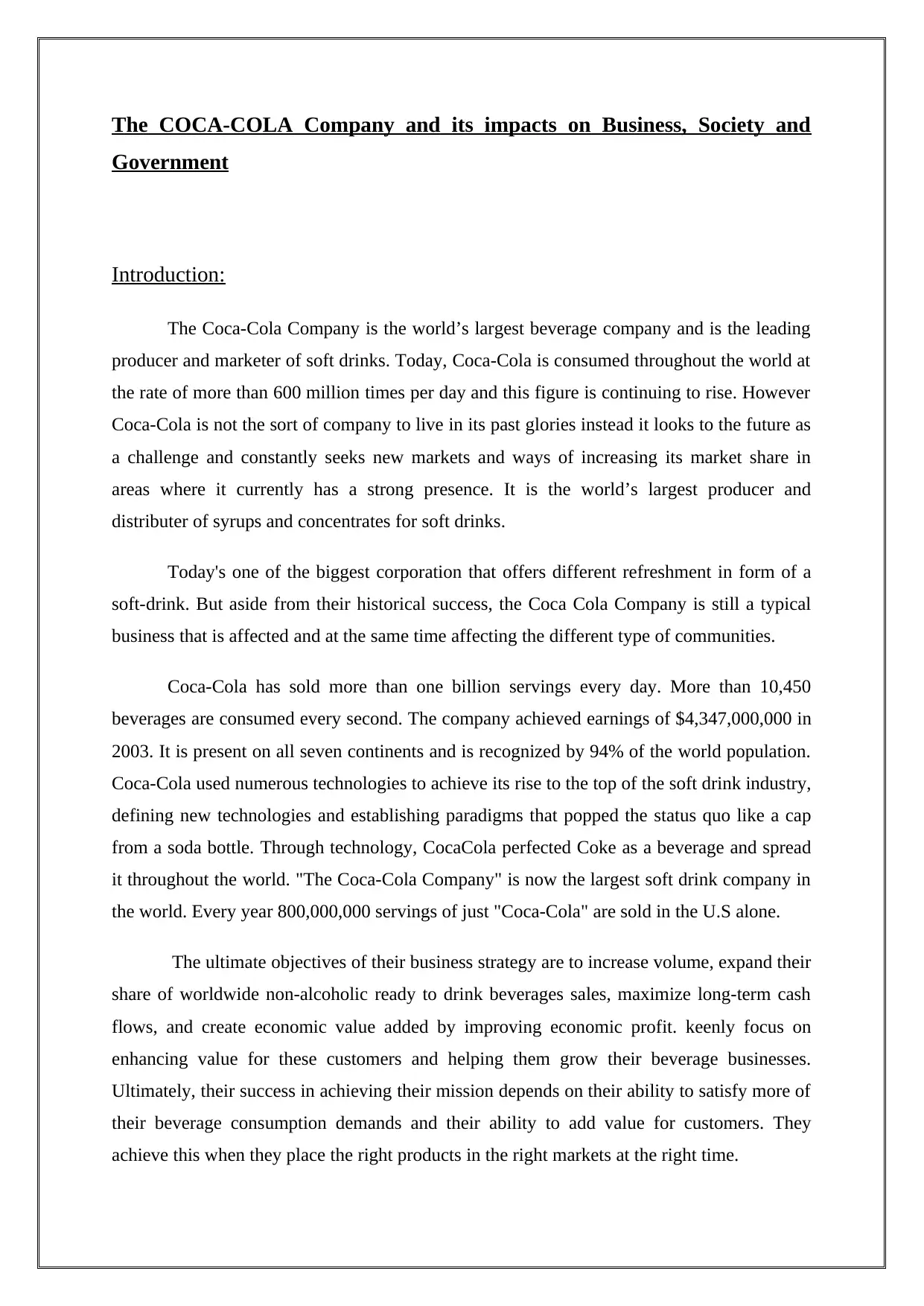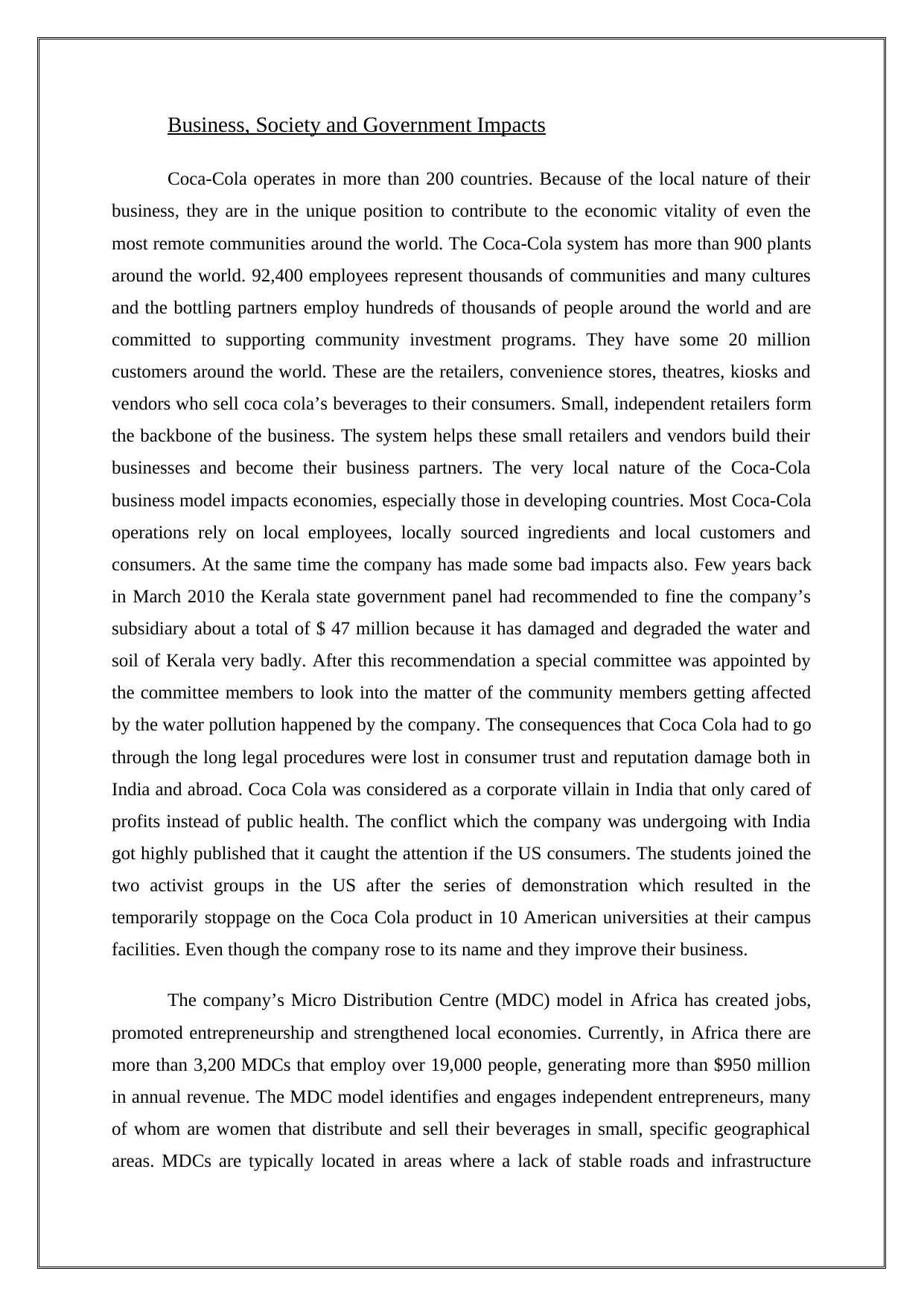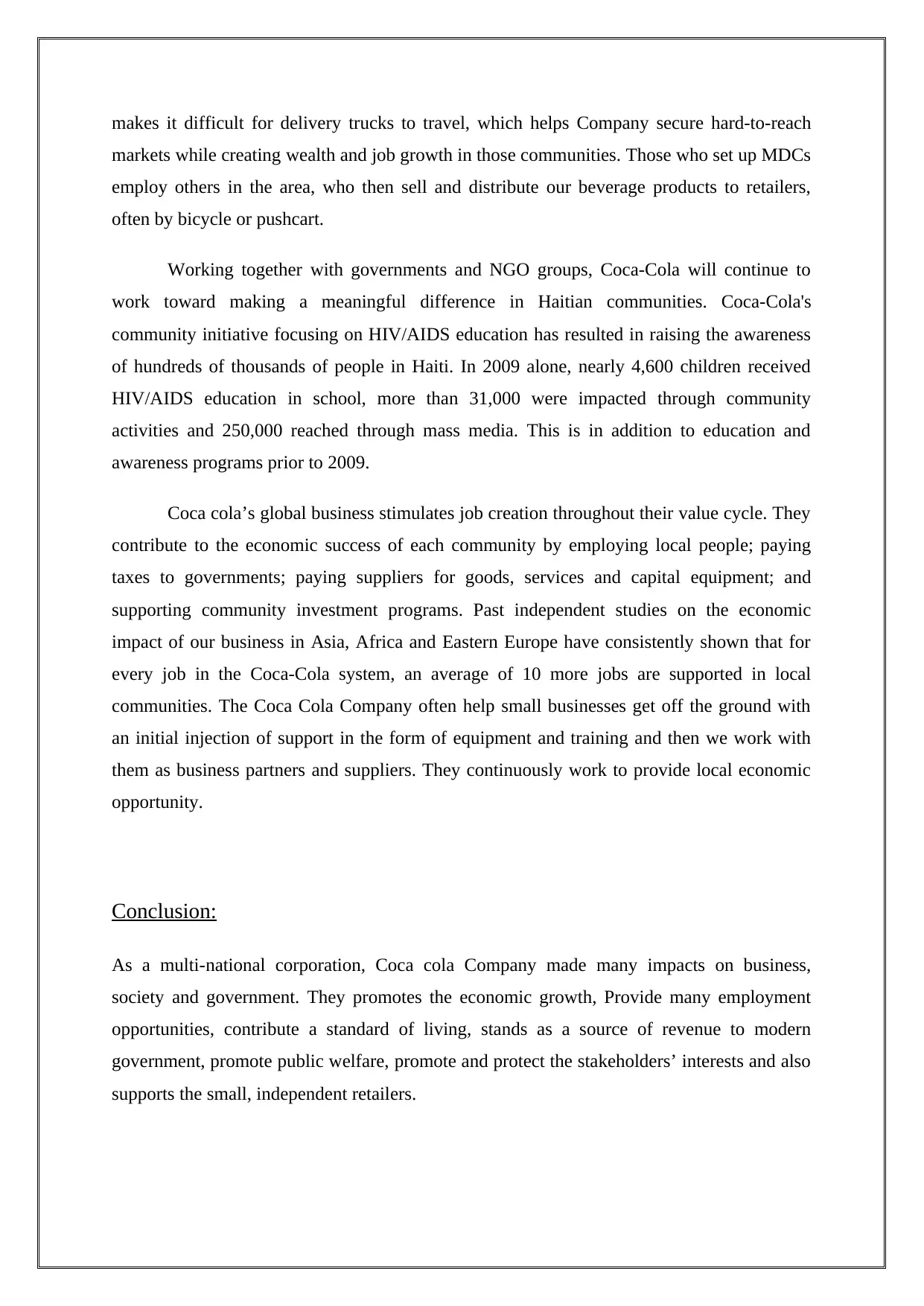Business and Society Analysis: Coca-Cola's Global Impact (MBA-A, 2019)
VerifiedAdded on 2021/07/29
|4
|1262
|109
Report
AI Summary
This report examines the multifaceted impact of the Coca-Cola Company on business, society, and government. It explores Coca-Cola's role as the world's largest beverage company, its global market presence, and its continuous efforts to expand market share. The report details the company's significant economic contributions, including job creation, support for small businesses, and revenue generation for governments. It also addresses the company's impact on local communities, particularly in developing countries, highlighting both positive initiatives like the Micro Distribution Centre model in Africa and negative consequences such as environmental damage and public health concerns. The analysis covers Coca-Cola's business strategies, its interactions with various stakeholders, and its response to criticisms and controversies, providing a comprehensive overview of its influence on the global landscape.

Business and Society
ASSIGNMENT 3
Submitted To
Anjana S
Assistant Professor,
Adisankara Business School.
Submitted By
Arya Dileep
Roll no: 22, MBA-A
Submitted on: 25/9/2019.
ASSIGNMENT 3
Submitted To
Anjana S
Assistant Professor,
Adisankara Business School.
Submitted By
Arya Dileep
Roll no: 22, MBA-A
Submitted on: 25/9/2019.
Paraphrase This Document
Need a fresh take? Get an instant paraphrase of this document with our AI Paraphraser

The COCA-COLA Company and its impacts on Business, Society and
Government
Introduction:
The Coca-Cola Company is the world’s largest beverage company and is the leading
producer and marketer of soft drinks. Today, Coca-Cola is consumed throughout the world at
the rate of more than 600 million times per day and this figure is continuing to rise. However
Coca-Cola is not the sort of company to live in its past glories instead it looks to the future as
a challenge and constantly seeks new markets and ways of increasing its market share in
areas where it currently has a strong presence. It is the world’s largest producer and
distributer of syrups and concentrates for soft drinks.
Today's one of the biggest corporation that offers different refreshment in form of a
soft-drink. But aside from their historical success, the Coca Cola Company is still a typical
business that is affected and at the same time affecting the different type of communities.
Coca-Cola has sold more than one billion servings every day. More than 10,450
beverages are consumed every second. The company achieved earnings of $4,347,000,000 in
2003. It is present on all seven continents and is recognized by 94% of the world population.
Coca-Cola used numerous technologies to achieve its rise to the top of the soft drink industry,
defining new technologies and establishing paradigms that popped the status quo like a cap
from a soda bottle. Through technology, CocaCola perfected Coke as a beverage and spread
it throughout the world. "The Coca-Cola Company" is now the largest soft drink company in
the world. Every year 800,000,000 servings of just "Coca-Cola" are sold in the U.S alone.
The ultimate objectives of their business strategy are to increase volume, expand their
share of worldwide non-alcoholic ready to drink beverages sales, maximize long-term cash
flows, and create economic value added by improving economic profit. keenly focus on
enhancing value for these customers and helping them grow their beverage businesses.
Ultimately, their success in achieving their mission depends on their ability to satisfy more of
their beverage consumption demands and their ability to add value for customers. They
achieve this when they place the right products in the right markets at the right time.
Government
Introduction:
The Coca-Cola Company is the world’s largest beverage company and is the leading
producer and marketer of soft drinks. Today, Coca-Cola is consumed throughout the world at
the rate of more than 600 million times per day and this figure is continuing to rise. However
Coca-Cola is not the sort of company to live in its past glories instead it looks to the future as
a challenge and constantly seeks new markets and ways of increasing its market share in
areas where it currently has a strong presence. It is the world’s largest producer and
distributer of syrups and concentrates for soft drinks.
Today's one of the biggest corporation that offers different refreshment in form of a
soft-drink. But aside from their historical success, the Coca Cola Company is still a typical
business that is affected and at the same time affecting the different type of communities.
Coca-Cola has sold more than one billion servings every day. More than 10,450
beverages are consumed every second. The company achieved earnings of $4,347,000,000 in
2003. It is present on all seven continents and is recognized by 94% of the world population.
Coca-Cola used numerous technologies to achieve its rise to the top of the soft drink industry,
defining new technologies and establishing paradigms that popped the status quo like a cap
from a soda bottle. Through technology, CocaCola perfected Coke as a beverage and spread
it throughout the world. "The Coca-Cola Company" is now the largest soft drink company in
the world. Every year 800,000,000 servings of just "Coca-Cola" are sold in the U.S alone.
The ultimate objectives of their business strategy are to increase volume, expand their
share of worldwide non-alcoholic ready to drink beverages sales, maximize long-term cash
flows, and create economic value added by improving economic profit. keenly focus on
enhancing value for these customers and helping them grow their beverage businesses.
Ultimately, their success in achieving their mission depends on their ability to satisfy more of
their beverage consumption demands and their ability to add value for customers. They
achieve this when they place the right products in the right markets at the right time.

Business, Society and Government Impacts
Coca-Cola operates in more than 200 countries. Because of the local nature of their
business, they are in the unique position to contribute to the economic vitality of even the
most remote communities around the world. The Coca-Cola system has more than 900 plants
around the world. 92,400 employees represent thousands of communities and many cultures
and the bottling partners employ hundreds of thousands of people around the world and are
committed to supporting community investment programs. They have some 20 million
customers around the world. These are the retailers, convenience stores, theatres, kiosks and
vendors who sell coca cola’s beverages to their consumers. Small, independent retailers form
the backbone of the business. The system helps these small retailers and vendors build their
businesses and become their business partners. The very local nature of the Coca-Cola
business model impacts economies, especially those in developing countries. Most Coca-Cola
operations rely on local employees, locally sourced ingredients and local customers and
consumers. At the same time the company has made some bad impacts also. Few years back
in March 2010 the Kerala state government panel had recommended to fine the company’s
subsidiary about a total of $ 47 million because it has damaged and degraded the water and
soil of Kerala very badly. After this recommendation a special committee was appointed by
the committee members to look into the matter of the community members getting affected
by the water pollution happened by the company. The consequences that Coca Cola had to go
through the long legal procedures were lost in consumer trust and reputation damage both in
India and abroad. Coca Cola was considered as a corporate villain in India that only cared of
profits instead of public health. The conflict which the company was undergoing with India
got highly published that it caught the attention if the US consumers. The students joined the
two activist groups in the US after the series of demonstration which resulted in the
temporarily stoppage on the Coca Cola product in 10 American universities at their campus
facilities. Even though the company rose to its name and they improve their business.
The company’s Micro Distribution Centre (MDC) model in Africa has created jobs,
promoted entrepreneurship and strengthened local economies. Currently, in Africa there are
more than 3,200 MDCs that employ over 19,000 people, generating more than $950 million
in annual revenue. The MDC model identifies and engages independent entrepreneurs, many
of whom are women that distribute and sell their beverages in small, specific geographical
areas. MDCs are typically located in areas where a lack of stable roads and infrastructure
Coca-Cola operates in more than 200 countries. Because of the local nature of their
business, they are in the unique position to contribute to the economic vitality of even the
most remote communities around the world. The Coca-Cola system has more than 900 plants
around the world. 92,400 employees represent thousands of communities and many cultures
and the bottling partners employ hundreds of thousands of people around the world and are
committed to supporting community investment programs. They have some 20 million
customers around the world. These are the retailers, convenience stores, theatres, kiosks and
vendors who sell coca cola’s beverages to their consumers. Small, independent retailers form
the backbone of the business. The system helps these small retailers and vendors build their
businesses and become their business partners. The very local nature of the Coca-Cola
business model impacts economies, especially those in developing countries. Most Coca-Cola
operations rely on local employees, locally sourced ingredients and local customers and
consumers. At the same time the company has made some bad impacts also. Few years back
in March 2010 the Kerala state government panel had recommended to fine the company’s
subsidiary about a total of $ 47 million because it has damaged and degraded the water and
soil of Kerala very badly. After this recommendation a special committee was appointed by
the committee members to look into the matter of the community members getting affected
by the water pollution happened by the company. The consequences that Coca Cola had to go
through the long legal procedures were lost in consumer trust and reputation damage both in
India and abroad. Coca Cola was considered as a corporate villain in India that only cared of
profits instead of public health. The conflict which the company was undergoing with India
got highly published that it caught the attention if the US consumers. The students joined the
two activist groups in the US after the series of demonstration which resulted in the
temporarily stoppage on the Coca Cola product in 10 American universities at their campus
facilities. Even though the company rose to its name and they improve their business.
The company’s Micro Distribution Centre (MDC) model in Africa has created jobs,
promoted entrepreneurship and strengthened local economies. Currently, in Africa there are
more than 3,200 MDCs that employ over 19,000 people, generating more than $950 million
in annual revenue. The MDC model identifies and engages independent entrepreneurs, many
of whom are women that distribute and sell their beverages in small, specific geographical
areas. MDCs are typically located in areas where a lack of stable roads and infrastructure
⊘ This is a preview!⊘
Do you want full access?
Subscribe today to unlock all pages.

Trusted by 1+ million students worldwide

makes it difficult for delivery trucks to travel, which helps Company secure hard-to-reach
markets while creating wealth and job growth in those communities. Those who set up MDCs
employ others in the area, who then sell and distribute our beverage products to retailers,
often by bicycle or pushcart.
Working together with governments and NGO groups, Coca-Cola will continue to
work toward making a meaningful difference in Haitian communities. Coca-Cola's
community initiative focusing on HIV/AIDS education has resulted in raising the awareness
of hundreds of thousands of people in Haiti. In 2009 alone, nearly 4,600 children received
HIV/AIDS education in school, more than 31,000 were impacted through community
activities and 250,000 reached through mass media. This is in addition to education and
awareness programs prior to 2009.
Coca cola’s global business stimulates job creation throughout their value cycle. They
contribute to the economic success of each community by employing local people; paying
taxes to governments; paying suppliers for goods, services and capital equipment; and
supporting community investment programs. Past independent studies on the economic
impact of our business in Asia, Africa and Eastern Europe have consistently shown that for
every job in the Coca-Cola system, an average of 10 more jobs are supported in local
communities. The Coca Cola Company often help small businesses get off the ground with
an initial injection of support in the form of equipment and training and then we work with
them as business partners and suppliers. They continuously work to provide local economic
opportunity.
Conclusion:
As a multi-national corporation, Coca cola Company made many impacts on business,
society and government. They promotes the economic growth, Provide many employment
opportunities, contribute a standard of living, stands as a source of revenue to modern
government, promote public welfare, promote and protect the stakeholders’ interests and also
supports the small, independent retailers.
markets while creating wealth and job growth in those communities. Those who set up MDCs
employ others in the area, who then sell and distribute our beverage products to retailers,
often by bicycle or pushcart.
Working together with governments and NGO groups, Coca-Cola will continue to
work toward making a meaningful difference in Haitian communities. Coca-Cola's
community initiative focusing on HIV/AIDS education has resulted in raising the awareness
of hundreds of thousands of people in Haiti. In 2009 alone, nearly 4,600 children received
HIV/AIDS education in school, more than 31,000 were impacted through community
activities and 250,000 reached through mass media. This is in addition to education and
awareness programs prior to 2009.
Coca cola’s global business stimulates job creation throughout their value cycle. They
contribute to the economic success of each community by employing local people; paying
taxes to governments; paying suppliers for goods, services and capital equipment; and
supporting community investment programs. Past independent studies on the economic
impact of our business in Asia, Africa and Eastern Europe have consistently shown that for
every job in the Coca-Cola system, an average of 10 more jobs are supported in local
communities. The Coca Cola Company often help small businesses get off the ground with
an initial injection of support in the form of equipment and training and then we work with
them as business partners and suppliers. They continuously work to provide local economic
opportunity.
Conclusion:
As a multi-national corporation, Coca cola Company made many impacts on business,
society and government. They promotes the economic growth, Provide many employment
opportunities, contribute a standard of living, stands as a source of revenue to modern
government, promote public welfare, promote and protect the stakeholders’ interests and also
supports the small, independent retailers.
1 out of 4
Related Documents
Your All-in-One AI-Powered Toolkit for Academic Success.
+13062052269
info@desklib.com
Available 24*7 on WhatsApp / Email
![[object Object]](/_next/static/media/star-bottom.7253800d.svg)
Unlock your academic potential
Copyright © 2020–2025 A2Z Services. All Rights Reserved. Developed and managed by ZUCOL.





